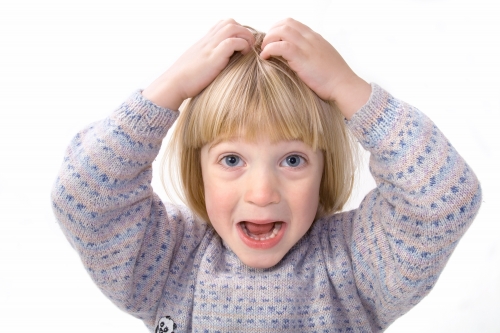If your child comes home with head lice, you may have a lot of questions. It’s important to keep in mind that head lice are treatable with care, time, and patience.
Speak with your health care provider or pharmacist before using any chemical shampoos if:
- You are pregnant or breastfeeding.
- Your child is under two years of age, has asthma, or allergies.

Download and print the Head Lice Fact Sheet, available in English, French, Arabic and Spanish.
How do you get head lice?
- Direct head-to-head contact.
- Through indirect contact with shared items such as combs, brushes, hats, helmets, headphones, bedding, towels, and stuffed animals.
How do I check for head lice?
- Lice are small and move fast, so they can be hard to spot. Good lighting and a magnifying glass may be helpful.
- Nits are oval, whitish-grey, tan or yellow, and about the size of a grain of sand usually attached to the hair shaft. Adult lice are about the size of a sesame seed.
- To look for nits, part hair in small sections, moving from one side of the head to the other. Look close to the scalp. Lice are usually found near the scalp, behind the ears and at the bottom of the neck.
- If you only find nits and no lice, check again every day for 1 week to make sure that you did not miss any live lice.
How do you treat head lice?
- Use the specific recommended shampoo/conditioner treatments and then wet combing the entire head to remove all lice/nits.
- Wet combing method used alone every 3-4 days is non-chemical but less effective.
Traditional treatments usually work best for head lice but there is a cost for these products:
- If you have private insurance:
- Check your plan(s) to see if lice treatments are covered. A prescription is needed. Depending on the insurance company’s process, you may have to submit a claim for any treatments that are covered.
- If you don’t have private insurance:
- The OHIP+ program may cover lice treatments. To find out if a treatment is covered, ask a pharmacist or check online. If it is covered, you’ll need a prescription from a health care provider (i.e., doctor or nurse practitioner). Once you have the prescription and your child’s health card, you can get the treatment at the pharmacy.
- If you receive government funding through Ontario Works (OW) or Ontario Disability Support Program (ODSP):
- You may receive lice treatment products at low cost or no-cost from pharmacies with a prescription. Refer to the Ontario Drug Benefit Program to check if a treatment is covered.
- If you don’t have a health card:
- Some pharmacies, schools, or community health programs might help. They may offer low-cost or free lice treatments. You can contact them to see what options are available.
- If you have a social worker:
- Contact your social worker for help with lice treatment resources.
Should I sterilize the entire house every time my child comes home with head lice?
- Wash combs, brushes, towels, and anything else used during treatment with hot soapy water.
- Wash items used in the past two days (clothes, hats, pillowcases, sheets, and stuffed animals).
- Seal items that cannot be washed in a plastic bag for two weeks.
- Vacuum or wash your child's car seat cover.
- Vacuum mattresses and floors to pick up stray lice or eggs.
- Excessive cleaning is not needed.
- Do not use insecticide sprays.
Do I have to treat everyone in the house for head lice?
- Only people who have head lice should be treated.
- Pets do not get head lice.
How do you prevent head lice?
- Check your child’s head routinely for head lice.
- Discourage children from sharing clothing (i.e., hats, hair accessories), towels, and combs.
- Tea tree oil and hair styling products such as hair gel or mousse have not been proven effective in prevention of head lice.
Resources
- Lice Squad free training video on How to get rid of head lice- reduction combing video.

